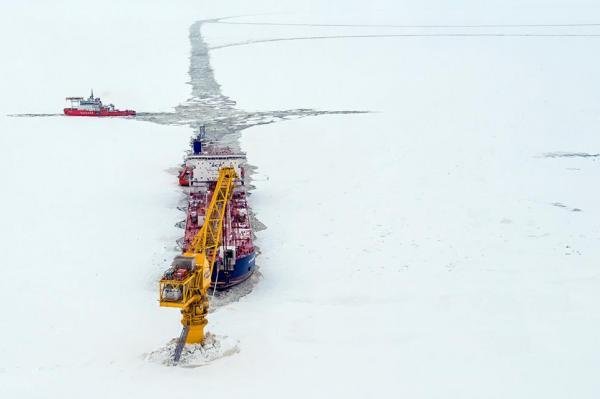A Russian geologist claims edge in the assessment of oil and natural gas reserves above the Arctic Circle. Photo courtesy of Gazprom Neft.
May 10 (UPI) -- Ahead of a meeting of littoral states, a Russian expert said Wednesday there are new methods to offer an edge in assessing Arctic oil and gas reserves.
Vladimir Cheverda, a project director at Russia's Institute of Oil and Gas Geology and Geophysics, was quoted by state news agency Tass as saying seismic surveys used to get a better understanding of reserve potential is difficult given the geological and technical challenges of working in extreme climates.
"Some oil companies attempted to establish systems of observation on floating ice but faced uncontrollable hindrances," he said. "We managed to determine the source of the obstacles and are developing completely new methods for 3D seismic survey of minerals, as well as software designed for modern high-capacity supercomputers."
A subsidiary of Gazprom Neft, the oil arm of Russian energy company Gazprom, said Friday total cumulative production from the Novoportovskoye field above the Arctic Circle has reached 5 million metric tons, or around 35 million barrels.
A total of 19 wells have been constructed so far this year at the field. Pilot projects were completed in 2014 and shipments facilitated by an icebreaking-vessel made it so the company could start delivering oil from the extreme north about a year ago.
Cheverda's comments come one day before parties to the multilateral Arctic Council meet in Alaska to discuss environmental, economic and geopolitical concerns. The United States this week hands the rotating leadership of the council over to Finland.
Russian Foreign Minister Sergei Lavrov is in Washington meeting with the U.S. president and Secretary of State Rex Tillerson. A report from Russian business daily Kommersant described bilateral relations with Washington as "rocky," though both sides have an amicable relationship when it comes to the Arctic.
David Balton, the U.S. deputy assistant secretary for the Bureau of Oceans and International Environmental and Scientific Affairs, said earlier this week that melting sea ice has opened shipping lanes in the Arctic, which could present environmental concerns to littoral states.
"That's a kind of security issue too, preparing for those types of incidents, and the Arctic Council has been working on things like that as well," he said.















